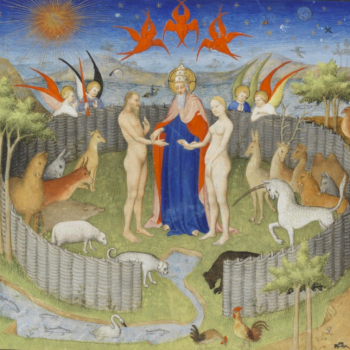
I was raised to treat everyone with respect. All my life, I have tried to do my best to treat everyone as equals. My opinions of people are formed based upon what they do, not their background. That is, I didn’t consider someone’s race or gender when forming the way I perceive them as a person. If I did not know someone, my general default has always been to see them as someone worthy of honor and respect. Of course, if my interactions with someone were not so positive, that could and would influence my view of them. Similarly, if someone did something extraordinary, something which I valued, that also influenced how I viewed them. I believed the way I treated people meant I had overcome the problems connected with racism and sexism, because I myself didn’t hold any such prejudices. However, when I grew to understands how racism and sexism worked, I began to see that there was more to both of them than such simple prejudices. Racism and sexism create systemic structures which influence the possibilities people have in their lives; they allow some people to be raised with and possess a kind of privilege that others do not have, a privilege which many of them think everyone else has but do not, because racism and sexism makes sure many are raised with disadvantages which make it difficult for them to be treated equitably in society. My “neutrality,” far from overcoming racism and sexism, helped mask the way both continued to exist in society, that is, it helped reinforce the problems of each because I was interested in preserving the status quo, a status quo which had been created by and continued to perpetuate elements of racism and sexism.
This is something which took me quite some time to really grasp, but the more I did so, the more I understood we not only need to confront the continued influences of racism and sexism in the world today, but we also need to explore those influences so that we can better understand where they came from and how they hurt some people and artificially elevate others. When we know the cause of the problem, we will have a better grasp of what we need to do to fix it. To do this right, we need to hear the voices of those affected by racism and sexism. We need to hear their stories, both in regards the present, but also in the past. One of the ways privilege works, one of the ways it preserves itself, is to have those who hold it be the ones who control the narrative society listens to, which means, it has them silence those who are unjustly harmed by the rules which govern society, This is what makes Black History Month and Women’s History Month (among many others) important. They help us turn to those who have been marginalized and hindered by racism and sexism, making sure their voices are no longer silenced, no longer ignored. That way, we will have a better picture of what not only happened in the past, but what is happening today, a picture which, once again, is necessary to possess if we are to change things for the better.
As a Christian, as a Catholic, as a Byzantine Catholic, Women’s History Month makes me ponder many things. First, I consider the way women, and their voices, have been silenced for most of Christian history. Yes, there are some exceptional women, some who we know about, who have left us writings, whose deeds are recorded for us for our edification, but they represent the exceptions to the rule. They do give us some insight which we would not otherwise have, and I am grateful for their witness, which is why I have been making an effort to study all that is available. There are many who come to mind, among which are: The Theotokos, St. Mary Magdalene, St. Thekla, St. Phoebe, St. Catherine of Alexandria, St. Mary of Egypt, St. Macrina, St. Pulcheria, St. Hildegard, St. Catherine of Siena, St. Teresa of Avila, and St Edith Stein. However, for every record we have, there are many more which we do not have. We have less examples of the stories and witness of ordinary Christian women, their trials and tribulations, their faith and spiritual experiences, than we have of men coming from similar social backgrounds. Similarly, for those we do remember, many of them have had their stories, their lives, their works, edited (and so mediated) by men in positions of power and authority, meaning, there is likely much which has been lost or changed in their transmission.
Today, there are more women theologians than ever before. There are more women of action, contributing what they can to both the church and society at large. This means, there has been some positive change in society. However, we must not think we have overcome the problems of the past. Things have not completely leveled out. Women still find their voices ignored. While women theologians contribute more to the general theological discourse today than in the past, their work is known more by professional theologians than the ordinary Christian. Their work, and what they have to say, has not been sufficiently popularized. The general Christian public remains unaware of what they have to day. In many cases, this is because the men who would do the most to popularize their works, priests and preachers, have not taken the interest to do so; either through negligence, if not malice, they continue to silence the voice of women. Even I, thanks to the kinds of theological interests I have (such as patristics, especially in relation to reading original patristic sources instead of contemporary discussions of them), find myself easily falling behind in reading and studying contemporary theology, and with it, what women have to say. Realizing the problem this has made, and the imbalance it creates, I have had to force myself to take a greater interest in modern theology, and with it, to look for and study from a diverse range of voices, especially women’s voices. The more I do so, the more I find it is imperative I continue to do so, engaging what I read the same way I read patristic authors, where I find I often do not agree with everything that I read but yet, find much of value that I use for my own theological development.
Women’s History Month, therefore, serves as an important reminder of the way women’s voices in the past, and with it, women’s history, has been silenced. It tells us that women should no longer be silenced. We can and should listen to them and their stories. We should do what we can to not only listen to women today, but to take the time to study history, using what women’s voices we have from history to do so. It is a reminder for me as a Christian to consider Christian history and the various roles women have had in it. It is a reminder, moreover, that until we have done this, until we truly have taken women’s history seriously, to learn from it, we have not moved beyond the sexism of the past, but rather, find ourselves caught in the systemic structures of sin which silenced women and kept them away from positions of power and authority. While I want to deal with people on a person to person basis, I know that I must do much more than that, and work to make sure those who have been unjustly undermined and silenced are lifted up so that they can truly be treated as equals. This is why it is important for us not to just deal with notions of equality, but also equity, for without such consideration, there will never be true equality.
* This Is Part XLVI Of My Personal Reflections And Speculations Series
Stay in touch! Like A Little Bit of Nothing on Facebook.
If you liked what you read, please consider sharing it with your friends and family!
N.B.: While I read comments to moderate them, I rarely respond to them. If I don’t respond to your comment directly, don’t assume I am unthankful for it. I appreciate it. But I want readers to feel free to ask questions, and hopefully, dialogue with each other. I have shared what I wanted to say, though some responses will get a brief reply by me, or, if I find it interesting and something I can engage fully, as the foundation for another post. I have had many posts inspired or improved upon thanks to my readers.












